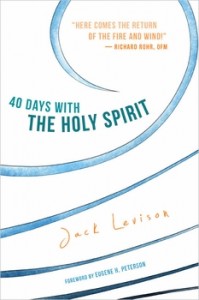 One of the richest, most complicated, and ineffable topics in theology is the Spirit. Some Christians call it the Holy Ghost, though I much prefer the Hebrew term ruach. Breath. Wind. Air. When I have the opportunity to do a little Hebrew vocabulary with my students, I have them hold one hand in front of their mouth, and say the word out loud, drawing out the uuuu and the ccchhh sounds.
One of the richest, most complicated, and ineffable topics in theology is the Spirit. Some Christians call it the Holy Ghost, though I much prefer the Hebrew term ruach. Breath. Wind. Air. When I have the opportunity to do a little Hebrew vocabulary with my students, I have them hold one hand in front of their mouth, and say the word out loud, drawing out the uuuu and the ccchhh sounds.
Try it. You can feel it … your breath. It’s warm, moist, maybe even a little stinky depending on what you had for lunch.
We talk about how one of the most basic differences between a dead body and a live body is breath. How people in the ancient world would have understandably attached the concept of breath, which is life itself, to their creator god. We also talk about how it’s a strange thing to explain, the spirit. I love this image, from artist Lucy Synk, of ruach.
I tell a story about one of my nephews asking (when he was about 5) at a funeral home visitation, upon seeing the open casket with my grandmother, his great-grandmother, in it, “so, when is she going to heaven?” I said, “well, we think that maybe she’s already there.” He said, pointing toward the casket, “no, she’s right there.”
Right. She was. And she wasn’t.
I tried to explain to him the difference between body and spirit … I’m not sure how good it was, but it satisfied him for the evening.
 It’s a tough thing to capture and explain, the spirit. And it’s not that Jack Levison claims to have captured and organized the Holy Spirit herself for readers of his new book, 40 Days With the Holy Spirit, it’s that he’s trying to make the ineffable accessible. He does this through his writing, short pieces that are both personal and theological, making decades of complex biblical scholarship available in focused bits. The forty essays, meant to be read one-a-day-for-forty-days, are framed each by a few relevant verses of scripture, blank space for writing and reflecting, and a prayer to conclude.
It’s a tough thing to capture and explain, the spirit. And it’s not that Jack Levison claims to have captured and organized the Holy Spirit herself for readers of his new book, 40 Days With the Holy Spirit, it’s that he’s trying to make the ineffable accessible. He does this through his writing, short pieces that are both personal and theological, making decades of complex biblical scholarship available in focused bits. The forty essays, meant to be read one-a-day-for-forty-days, are framed each by a few relevant verses of scripture, blank space for writing and reflecting, and a prayer to conclude.
It’s a highly ordered and practically oriented book. Which is awesomely inappropriate for its topic … the chaotic and transcendent spirit of God. And this isn’t actually a criticism. It’s a recognition of the necessary disjuncture between what we as humans do, the prosaic and mundane and controlling things we do, and what a mysterious God of creation and redemption and providential care does.
It’s hard to explain, and yet we try. It’s hard to understand, and yet we glimpse. It’s hard to see, and yet we do. This happens in every religion, as a matter of fact, which is why I often find the topic of the spirit as one of the most beneficial when thinking about and engaging in interfaith cooperation. The spirit is, if nothing else, evidence that none of us human beings control and define all that there is of God.
When I think of trying to find, as Levison suggests, “a comfy space” or a “sacred spot” to spend time meditating on texts and ideas and the spirit itself, I think of my yoga mat. I’ve been casually studying and practicing yoga for over a decade now, and I always come back to the radical challenge of focusing on breath. Only breath. Calming the mind, especially the mind that lives in my overly active brain. Yoga, insofar as the word means “to yoke” or “unite” the physical, mental, and spiritual parts of the self, is for me a series of physical activities that are meant to call attention to the present. What your foot is doing now, here, on this mat. Where your shoulders are. How your knee feels. Whether you can continue standing for three more breaths. And the breath is a tool to help you do that. Because it’s hard to think about Tuesday’s meeting and last night’s worries and tomorrow’s to-do list when you’re trying valiantly to straighten out your Warrior III pose.
So Jack Levison’s book is a tool to help Christians focus on the present. It places just enough order and discipline onto the chaotic and ungovernable so as to make it visible. To help call attention to the fact that in many ways, we already have what we need. Words from the past, a call to the future, time to focus.
Here. Now. With this book. For a little while, and just breathe.
On a Related Note: I was part of a seminar on Gender & Christianity that Jack and his wife Priscilla Pope-Levison directed in 2010, which produced, in addition to several lasting friendships, a great book on Sex, Gender, and Christianity.












